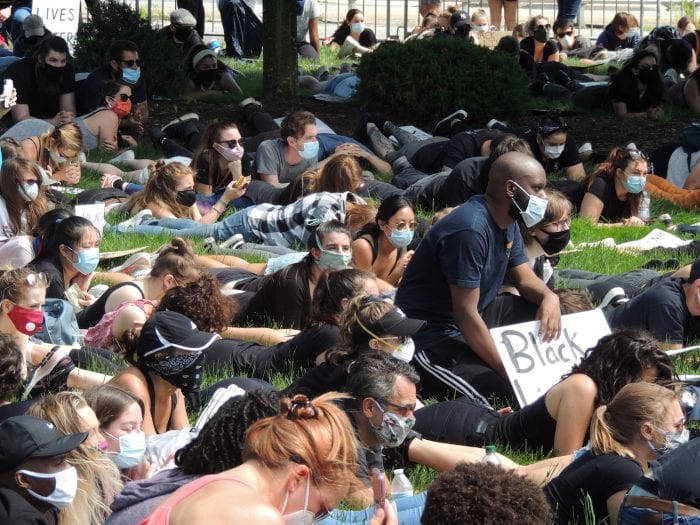George Floyd’s death in Minneapolis two weeks ago spurred nationwide protests and renewed conversations on police brutality and systemic racism in this country. TBR News Media reached out to prominent leaders in the black community to get their perspective on what needs to change and what immediate actions can be taken as we move forward. Here’s what they had to say.

Al Jordan, clinical associate professor at Stony Brook Medicine and former dean for Student and Minority Affairs:
We will need to work on life after the protests end, that’s when the hard work really starts. We will really need to see change in policy and in laws, not just on the national level but the local level as well.
Voter registration — getting more people to vote — is the most immediate change we can work on right now. It will take educating people, including family, friends and community members. It means engaging with people, it’s tough work but people can listen and be persuaded. Some may not, but it is another effective way of change.
You look at the segregation on Long Island, whether it’s in housing or in school districts, the racial, social and economic disparities — it feeds into the larger issue.
When it comes to training police officers, it has to begin with the individual person. What’s on their mind, how do they feel? Act on that framework. You also have to change the people who run things and who are at the top.
I’m optimistic, I believe in people. I see it in the young people, something that’s different from what I and others were doing in the 1960s. They have been able to bridge the gap, that cultural divide, and been able to find that common ground.
It has given me a lot of hope, seeing these young people like my own grandchildren engaging in these positive activities and important discussions.

Errol Toulon Jr. (D), Suffolk County sheriff:
All law enforcement need to reevaluate how they train their officers and how they operate. I don’t know how an officer with 18 prior complaints was allowed to continue to interact with the public.
Unfortunately, due to this recent incident and others like it, mistrust toward law enforcement is at an all-time high. We need to work together to regain that trust.
It’s having a conversation with them. It starts by talking to them and hearing their concerns, answering their questions and hopefully giving them a good understanding of what we do.
99 percent of police officers who come to work to serve and protect are good men and women. But those who do wrong need to be held accountable. Supervisors need to be held accountable as well.
Whether it is additional training or suspension it needs to be addressed immediately.
One thing departments and agencies can do is increase cultural awareness and diversity training. A lot of times these teachings end once they leave the door of the academy. We have to make sure that officers remain engaged with the black and minority communities. We must have respect for each other.
Another thing is making sure we are talking to our staff — monitoring their emotional and mental well being.
[On Monday, Suffolk County Sheriff’s Office announced the creation of a community advisory board to give residents an opportunity to meet regularly with the sheriff and staff and discuss concerns. The board will consist of five people from East End townships and five from the western towns in Suffolk. Members will serve for a one-year term.
“Current events have demonstrated that people from all racial and ethnic backgrounds are frustrated with law enforcement, and they have some legitimate reasons to feel this way,” Toulon said in a release.]

Elaine Gross, president of Syosset-based nonprofit ERASE Racism:
There’s currently conversation changing police policy, there’s a legislative package up in Albany that will be voted on soon. I’m pleased to hear that.
But we also need to have a conversation on how we got to where we are. There is structural racism.
On Long Island, due to segregation in school districts,, we know public school education looks very different in terms of the resources for black and minority students compared to white students.
This is a disparity that gets lost — people are not aware of it or just don’t want to talk about it. An education policy needs to be made a priority, and that means increasing the percentage of educators of color in the classroom — that includes Black, Latinx and Asian teachers. We have seen the benefits of students in a diverse learning environment.
In addition to the package up in Albany, we need an independent prosecutor, not someone who works closely with the police department. We have seen so many cases where so little happens and no charges brought down [on officers accused of misconduct]. It sort of goes away. We need to continue to strengthen race crime measures and increase body cams in law enforcement.
I’ve had forums with high school students in the past on structural racism, and I believe students are beginning to have a better understanding of what’s happening in the world and are more open to it than adults. I look to the students and young people to carry the movement forward.

Valerie Cartright, Brookhaven Town councilwoman (D-Port Jefferson Station):
It is clear that there is a movement happening, people are stepping up and saying, “Enough is enough.”
For 8 minutes and 46 seconds, the George Floyd incident showed white people in this country what it is like to be black in America. Now our voices are being heard.
There is legislation being passed in New York State that I support that is moving us in the right direction, but it is only scratching the surface. It is a good first step. We need to acknowledge these injustices and take immediate action.
We should have already had access to disciplinary records of officers — this information should have been made public. Also, we need to change the police culture. We need to make sure police officers feel comfortable in speaking out against bad officers. We have to have strong whistleblower protection.
I have represented [as an attorney] police officers who have spoken up about their comrades and they often face retaliation for violating or going against the brotherhood.
The majority of police officers are good people but if we don’t get rid of hate, racism and discrimination in these departments then we are never going to change the system.
I’m asking everybody to join in this movement, so we can be heard as one voice.





